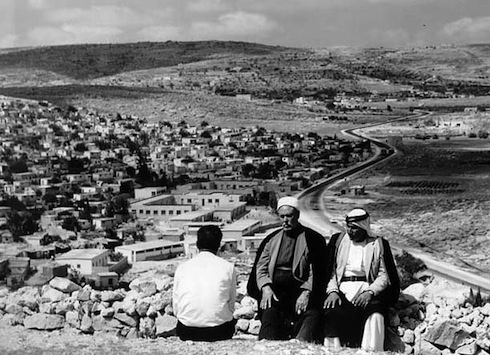The library in exile: Verso donates books to Campus in Camps, West Bank

Nathan Witt reflects on the origins of Campus in Camps, an experimental, community-based educational initiative in Dheisheh Camp, Bethlehem. Read up on, support, or donate to Campus in Camps here, and the Decolonizing Architecture Art Residency here.
By Nathan Witt, July 2015
Campus in Camps in Dheisheh Camp, Bethlehem, was first set up by Alessandro Petti and Sandi Hilal from Decolonizing Architecture (DAAR) in 2012. It is an experimental educational programme run by local and visiting volunteers from various backgrounds. The focus of the programme is on the production of alternative methods of shared knowledge, seeking to empower both the volunteers and the community through the sharing of lived experience. This way, Campus in Camps affords opportunities to negotiate what is too seldom understood as a site of permanent and normalised exile.
During Decolonizing Architecture’s 2014/15 winter residency, Campus in Camps worked on a variety of projects, from surveying the shifting Israeli border in Battir, Palestine’s chaotic quarrying industry, to building a concrete tent based on the 1947 UNRWA model, to bringing back to life the Edward Said Library at the Al Feneiq Centre, the Camp’s community centre, used for all of manner of things, from hosting weddings and funerals to yoga classes and local meetings. Next door, a series of lectures, workshops and other community events practice DAAR and Campus’ philosophy on educational reform, an alternative to the Palestinian tawjihi educational system. Campus on Camps' alternative instead seeks to be self-organized, anti-pedagogical, anti-hierarchical and resistant to the notion of the Palestinian refugee as a passive subject.
Verso Books was invited to donate books to the library selected by the community and the volunteers at Decolonizing Architecture so that it might start re-stocking its shelves. Al-Feneiq and the library are a central part of Dheisheh’s community, but the space has been forgotten over the years; at present, it’s empty, dusty and lacking in books. Its current stock contains outdated textbooks in Arabic, English and French, donated over the years by religious groups and charities from around the world. They are mainly children's textbooks or focus on subjects like engineering, literature and law. A few boxes of archival material remain, along with a large back catalogue of local newspapers. While outdated and faded from intense sunlight, these texts remain well used by the community, especially by those from Dheisheh who have been sponsored to go to university. But the normalisation of centres such as the camp library, while so important, can also provide little comfort for those wishing to return to seized or destroyed homes and land. This normalisation has become so prominent that one woman from Dheisheh speculated on whether she could take the camp back to her village with her, which is such a powerful notion.

Dheisheh camp, 1968.
Every Thursday, volunteers and the campus community would get together for collective readings from Decolonizing Architecture’s text ‘Architecture After Revolution’, often breaking down into laughter as the volunteers and locals mocked one another's reading voices. They discussed a variety of subjects, from the destruction of the village of Miska in 1948 to the desire of Palestinians to see the sea again, to moving beyond violence and the politics of recognition. The library itself will function naturally as a site for these activities, in addition to stocking a variety of texts that will maintain the traditional function of reading as an act of self-empowerment, where the text acts as a tool for reform. The project is less concerned as to whether the texts represent a particular type of political or industry knowledge, as Dheisheh has become one of the most concentrated areas of NGO’s on the planet and such an industry has become, in a sense, part of its normalisation. The same can be said of the academic language in the camp and of the subjects that are taught, including sociology, anthropology, art, psychology, philosophy, etc. This dissemination of knowledge exists on a precarious periphery, where the effectuality and potential of any given text, person, or collective remains indeterminate.
The following small list of authors suggests, to follow Walter Benjamin, a not-yet-unpacked library in which 'the books are not yet on the shelves, not yet touched by the mild boredom of order'. They are based on the collective desires of the Campus in Camps community and its volunteers, and, we hope, many more to follow.
Claire Bishop, Marc Augé, Keller Easterling, Judith Butler, Isabell Lorey, Boris Groys, Alexandre Kojève, Justin McGuirk, Samuel Moyn, Régis Debray, Benedict Anderson, David Macey, Edward Said, Christopher Hitchens, Norman Finklestein, Shlomo Sand, Vinayak Chaturvedi, Eyal Weizman, Giorgio Agamben, Tariq Ali, Ghada Khami, Jacqueline Rose, Chantal Mouffe, Ernesto Laclau, Alain Badiou, Medea Benjamin, Jeannie Sowers, Chris Toensing, Conor Foley, Gideon Levy, Mahmoud Darwish, Franco Moretti, Sayyed Hassan Nasrallah, Richard Falk, Howard Friel, Baruch Kimmerling, Abdirahman A. Hussein, Lynne Segal, David Tartakover, Roberto Mangabeira Unger, Michael Sorkin, Naila Kabeer, Hazem Kandil, Basak Ertur, Michèle Barrett, Ilan Pappe, Jacques Rancière, Etienne Balibar, Kathryn Tidrick, David Harvey, Edward W. Soja, Neil Smith, Mike Davis, Pierre Bourdieu, Arjun Appadurai, Hamid Dabashi, Ariella Azoulay, Astra Taylor, Mark Greif, Keith Gessen, Arundhati Roy, Primo Levi, Karl Marx, Ghassan Andoni, Huwaida Arraf, Nicholas Blincoe, Audrea Lim, Stefano Liberti, Vijay Prashad, Rosa Luxemburg, Slavoj Zizek, Eric Hazan, Dario Azzellini, Arun Kundnani, Theodore W. Allen, Stephen Graham, Matthew Beaumont, Marshall Berman.
To find out more about Campus in Camps and DAAR, including how to make a donation or spread the word, see their websites:
http://www.campusincamps.ps/about/
http://www.decolonizing.ps/site/